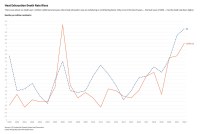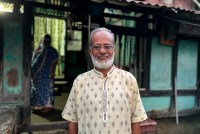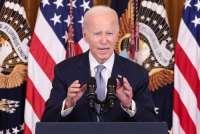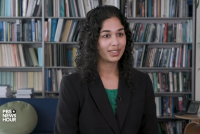Latest KFF Health News Stories
What the Health? From KFF Health News: Underinsured Is the New Uninsured
The percentage of working-age adults with health insurance went up and the uninsured rate dropped last year, the U.S. Census Bureau reported this week. There isn’t much suspense about which way the uninsured rate is now trending, as states continue efforts to strip ineligible beneficiaries from their Medicaid rolls. But is the focus on the uninsured obscuring the struggles of the underinsured? Margot Sanger-Katz of The New York Times, Sarah Karlin-Smith of the Pink Sheet, and Joanne Kenen of the Johns Hopkins Bloomberg School of Public Health and Politico join KFF Health News’ Emmarie Huetteman to discuss these issues and more.
Abortion Bans Fuel a Rise in High-Risk Patients Heading to Illinois Hospitals
High-risk patients from states that heavily restrict abortion are coming to hospitals in states such as Illinois that protect abortion rights. The journey can mean more medical risks and higher bills.
Watch: In Emergencies, First Comes the Ambulance. Then Comes the Bill.
This installment of InvestigateTV and KFF Health News’ “Costly Care” series delves into the lack of cost protections for patients who find themselves on the hook for an emergency ground ambulance ride.
Heat-Related Deaths Are Up, and Not Just Because It’s Getting Hotter
Excessive heat contributed to 1,670 deaths nationwide last year, according to federal data — the highest rate in at least two decades. An increase in drug use and homelessness, along with hotter temperatures, were among the reasons.
What the Health? From KFF Health News: Welcome Back, Congress. Now Get to Work.
Congress returns from its summer recess with a long list of tasks and only a few work days to get them done. On top of the annual spending bills needed to keep the government operating, on the list are bills to renew the global HIV/AIDS program, PEPFAR, and the community health centers program. Meanwhile, over the recess, the Biden administration released the names of the first 10 drugs selected for the Medicare price negotiation program.
NPR and KFF Health News Share the Story of Two Health Heroes Who Helped Stop Smallpox
Regina G. Barber from NPR’s “Shortwave” podcast speaks with physician-epidemiologist Céline Gounder about two men who were among the public health heroes who helped wipe out a 3,000-year-old virus, and the lessons that victory offers for the next public health emergency.
What the Health? From KFF Health News: 3 Health Policy Experts You Should Know
In this special episode of KFF Health News’ “What the Health?” host Julie Rovner interviews three health policy experts.
5 Things to Know About the New Drug Pricing Negotiations
The Biden administration unveiled the first 10 drugs subject to price negotiations, taking a swipe at the pharmaceutical industry. But what does it mean for patients?
Exclusive: CMS Study Sabotages Efforts to Bolster Nursing Home Staffing, Advocates Say
Research commissioned by the Centers for Medicare & Medicaid Services analyzed only staffing levels below what experts have previously called ideal. Patient advocates have been pushing for more staff to improve care.
Epidemic: Speedboat Epidemiology
In Bangladesh, smallpox eradication workers went to great lengths to vaccinate even one person, sometimes traveling by speedboat, crossing rickety bamboo bridges or leech-infested paddy fields. Episode 4 of the “Eradicating Smallpox” podcast is about what it takes to bring care directly to people where they are.
‘All We Want Is Revenge’: How Social Media Fuels Gun Violence Among Teens
Teens share photos or videos of themselves with guns and stacks of cash, sometimes calling out rivals, on Facebook, Instagram, Snapchat, or TikTok. When posts go viral, fueled by “likes” and comments, the danger is hard to contain.
Illustrated Report: How Gun Violence Goes Viral
As chatter and images about guns and violence slip into the social media feeds of more teens, viral messages fueled by “likes” can lead to real-world conflict and loss.
What the Health? From KFF Health News: A Not-So-Health-y GOP Debate
The first Republican presidential debate of the 2024 cycle took place without front-runner Donald Trump — and with hardly a mention of health issues save for abortion. Meanwhile, in Florida, patients dropped from the Medicaid program are suing the state for not giving them enough notice or a way to contest their being dropped from the program. Margot Sanger-Katz of The New York Times, Joanne Kenen of the Johns Hopkins Bloomberg School of Public Health and Politico, and Victoria Knight of Axios join KFF Health News’ Julie Rovner to discuss these issues and more. Plus, for “extra credit,” the panelists suggest health policy stories they read this week they think you should read, too.
What the Health? From KFF Health News: Abortion Pill’s Legal Limbo Continues
A federal appeals court issued a split decision on whether the abortion pill mifepristone should remain on the market — rejecting a lower court’s decision to effectively cancel the drug’s FDA approval in 2000, while ordering the rollback of more recent rules that made the drug easier to obtain. Nothing changes immediately, however, as the Supreme Court blocked the lower court’s ruling in the spring. It will be up to the high court to determine whether the pill remains available in the U.S. and under which conditions. Sarah Karlin-Smith of the Pink Sheet, Alice Miranda Ollstein of Politico, and Shefali Luthra of The 19th join KFF Health News’ chief Washington correspondent, Julie Rovner, to discuss these issues and more. Plus, for “extra credit,” the panelists suggest health policy stories they read this week they think you should read, too.
An Arm and a Leg: How a Surprise Bill Can Hitch a Ride to the Hospital
The No Surprises Act has helped rein in out-of-network medical bills, but ground ambulances are a costly exception. Hear why this service can still hit patients with big bills and what to do if you get one.
In the early 1970s, public health workers buoyed by the motto “zero pox!” worked across India to achieve 100% vaccination against smallpox. This episode is about what happened when these zealous young people encountered hesitation.
Watch: As Opioid Settlement Money Starts to Flow, States and Local Officials Debate How to Use It
PBS NewsHour featured KFF Health News’ Aneri Pattani as it reported on how this debate is playing out in North Carolina and Ohio.
What the Health? From KFF Health News: On Abortion Rights, Ohio Is the New Kansas
Nearly a year to the day after Kansas voters surprised the nation by defeating an anti-abortion ballot question, Ohio voters defeated a similar, if cagier, effort to limit access in that state. This week, they rejected an effort to raise the threshold for approval of future ballot measures from a simple majority, which would have made it harder to protect abortion access with yet another ballot question come November. Meanwhile, the number of Americans without health insurance has dropped to an all-time low, though few noticed. Joanne Kenen of the Johns Hopkins Bloomberg School of Public Health and Politico, Rachel Roubein of The Washington Post, and Emmarie Huetteman of KFF Health News join KFF Health News’ chief Washington correspondent, Julie Rovner, to discuss these issues and more. Also this week, Rovner interviews Kate McEvoy, executive director of the National Association of Medicaid Directors, about how the “Medicaid unwinding” is going, as millions have their eligibility for coverage rechecked.
As a Union Pushes to Cap Hospital CEO Pay, It’s Accused of Playing Politics
A union is asking Los Angeles city voters to cap hospital executive pay at the U.S. president’s salary. However, hospitals accuse the union of using the proposal as political leverage, and policy experts question whether the policy, if enacted, would be workable.
How the Texas Trial Changed the Story of Abortion Rights in America
Stark, plaintive testimony from women denied abortion care represents the start of “the 50-year fight to get rid of Dobbs,” one historian says.




















